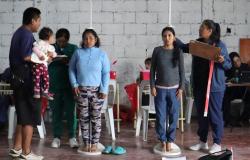An intrigue runs through the stunned Argentine political field: what is the government plan of Javier Milei? Is it a liberal, neoliberal, libertarian, right-wing, far-right plan? Or is it the famous and widely used let’s see? The question makes sense when it is the members of the government themselves who are disconcerted by each measure or decision that the president takes and for which they have to account to society. It is only clear that we must adjust and adjust even in ultra-necessary corners of the State and that even left foreign currency.
Photograph provided by the Presidency of Argentina showing the Argentine president, Javier Milei, during a cabinet meeting that included the Israeli ambassador to the country, Eyal Sela. Photo: EFE/Presidency of the Nation
Having a government plan is not something that arises spontaneously just by starting the path towards Pink House. In fact, there are very few Argentine presidents or candidates who thought of a finished plan before sitting in the presidential chair. Nor are those intellectuals or advisors who bring their ideas and projects to leaders at all levels of government very clear. With exceptions.
If we travel to XIX century We are going to encounter a dream of a nation with illusory projects, just as happened to Mariano Moreno as secretary of the First meeting government of 1810. He had a very active role. He was the author of the proclamation of May 28, by which the First Junta announced its installation to the people of the interior and the governments of the world. In just seven months he established a census office, planned the formation of a National Public Library; reopened the ports of Maldonado (Uruguay), Cove and Carmen de Patagones; He freed restrictions on commerce and mining operations, regulated the exercise of patronage over the Church, established military ordinances for officers and cadets, created new volunteer companies and organized the municipal police. He also had time to found and direct the Buenos Ayres Gazettethe official newspaper, from which he spread his ideas.
This relentless activism is probably the reason why he was awarded the authorship of a text known and published as a book for almost two centuries and with his signature with the title of Operations plan. It contains foreign and domestic policy instructions, military and economic measures and methods to achieve tactical and strategic objectives. It has an appendix, which contains five minutes that record the previous steps taken by the Buenos Aires Board for the preparation of the Plan, a few months after its constitution. It is no coincidence that they have attributed it to Moreno, because beyond the differences in political and economic criteria with that plan, he was the one who came closest to being in the intellectual and political conditions to write something like that. In fact, Juan Manuel de Rosas adopted some government policies from that text.
Did the “Generation of ’37” have a plan? They were young Argentine university intellectuals in the year 1837, whose main exponents were Domingo Faustino Sarmiento, Esteban Echeverria and Juan Bautista Alberdi. They called themselves children of the May revolution because they had been born shortly after its outbreak. They considered that they were the only ones qualified to make the country progress, they saw themselves as counterrevolutionaries since, although they agreed with having become independent from Spainthey did not share how this revolution had been carried out.
The hour of the sword
The one who had every intention of providing a plan to the first military government resulting from a coup d’état, that of 1930, was Leopoldo Lugones who adhered to socialism, liberalism, conservatism and fascism. In 1903 he was expelled from socialism by supporting the conservative candidacy of Manuel Quintana for the presidency. In the work of Domingo Faustino Sarmiento and of Jose Hernandez, Lugones finds what he calls “the formation of the national spirit.” But then he met Julio Argentino Roca and he became enthusiastic about the project of the generation of the eighties.
Leopoldo Lugones, writer, wanted to influence Uriburu, but he did not succeed.
Lugones becomes a publicist for the military coup carried out by Jose Felix Uriburu on September 6, 1930, which overthrew the radical from the presidency Hipólito Yrigoyen. For this reason, he is rejected from Buenos Aires intellectual circles. He became one of the main sponsors of Argentine fascism, especially after 1924, the date on which he proclaimed that “the time of the sword” had arrived. He committed suicide in 1938. As he said, he Juan José Sebreli, “the sad merit of discovering – or inventing – the new historical subject, destined to replace both the enlightened liberal oligarchy and the electoral masses: the Army.” Uriburu wasn’t interested in having a plan.
Those who had no interest in surrounding themselves with advisors, much less intellectuals, were Juan Domingo Peronauthor of First Five Year Plan Argentine, also known as Government Plan 1947-1951. One of Perón’s main objectives was to achieve economic independence and his plan raised the need to unify the measures that affected exports and imports. He established a minimum five-year program of works and investments necessary to ensure an adequate supply of raw materials, fuel and mechanical equipment, rationally developing the country’s industry and agriculture. Of course, plans never suit everyone. In 1955 A new coup d’état was going to destroy these initiatives and put things back in their traditional place. agro-export model.
Arturo Frondizi, president between 1958 and 1962.
Arturo Frondizi thought a country, without a doubt. His government adopted developmentalism as a central policy; He took note of the recommendations of the ECLAC and the definitions of the Dependency Theory, developed starting in the 1950s by intellectuals from all over Latin America. In any case, Frondicist developmentalism differed from ECLAC by resorting mainly to the establishment of multinational companies, rather than the State, as a factor driving industrial development.
The repressive model of the Argentine revolution devastated the constitutional government of Arturo Illia, which had no fixed direction or a very clear roadmap. In the 70s perhaps there were too many government plans, including the most radical ones such as those proposed by the revolutionary organizations that had opted for armed route. Perón returned as a ghost and then Isabel could barely manage the deep crisis that the country was experiencing.
If the dictatorship of 1976 He had a plan that was very simple and brutal: reform the economic model again towards the agro-exporter and defeat the opponents with blood and fire. From 1983 An era of democratic recovery would begin and governments were going to succeed one another with attempts at partial plans at best. In most cases they handled themselves in an improvised way and were attentive to the economic winds of the world and its global decisions.
Tomás Abraham, philosopher and permanent critic of the political scene. Photo: Martín Bonetto.
In an interview with the philosopher Thomas Abrahamduring the government of Mauricio Macri, I asked him about this question. He told me: “Sometimes there are plans, the last government that had an idea – which is more than a plan – was Frondizi’s and that happened a long time ago. I think convertibility was a plan Erman González, Menem, Domingo Cavallo. It was an idea that had to do with certain guidelines, he ordered in a certain way. Alfonsin He didn’t have any. Today politics depends on how you manage finances. Then situations are taken advantage of. Kirchner He took advantage of a situation he had with raw materials plus the disaster of 2001. Suddenly he had money, he fed the domestic market and then everything went to hell. He was able to maneuver until he went crazy with power – which is what always happens. That’s not a plan, that’s taking advantage of a situation. Perón took advantage of an extraordinary situation after the Second war. The plan arises when you do not have favorable situations. This government is not in a favorable situation but I don’t see any plan for it either. You can’t do it if you depend on someone else. We are a peripheral, marginal and dependent country. We are not the puppet of the Uncle Sam or the Chinese uncle but the degree of autonomy is very small. Macri says: “investments are going to rain,” and it doesn’t rain at all, he had a wish, not a plan. The plan is someone else who says that he will return in 10 years; For us it is a lot and they are in no hurry. Let’s see, they tell you.”
From the government of Alberto Fernandez We know without a doubt that there was no plan, only improvised responses to countless inconveniences that we did not know how to face. Now it’s the unexpected president’s turn. Will someone be writing you a plan?






